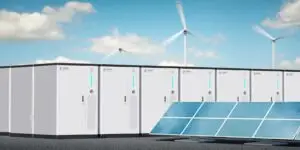Solar power is a renewable and currently popular energy source, thanks in part to the innovation of solar panel and battery technology. The lifespan of solar panel batteries is an important factor to understand, should one be interested in a solar energy system. In this blog, we will discuss the lifespan of these batteries, what affects their life, and how to get the most out of their duration.
What are Solar Panel Batteries?
But first, what are solar panel batteries and what do they do in a solar energy system? Solar panels turn the sun rays into electricity that is either consumed on the spot, stored in batteries, or exported to the grid. Solar panel batteries are necessary for energy storage so that you can still use solar energy even in the absence of the sun.
Solar Battery Types
Solar energy systems primarily utilize two battery types: lead-acid and lithium-ion.
Lead-Acid Batteries: This is a conventional option and tends to be less expensive. Nevertheless, they are less durable and need more care than lithium-ion batteries.
Lithium-Ion Batteries: These have a higher price but last longer, are more efficient, and need less maintenance. They are emerging as the material of choice in numerous solar energy systems.
Solar Panel Battery Life
Solar panel batteries have a lifespan that may depend considerably on the battery type, usage, and maintenance. Let us take a closer look at what each type has to offer.
Lead-Acid Batteries
The lifespan of lead-acid batteries is 3 to 5 years. They might occasionally last 7 years with good care.
Various factors determine their lifespan including:
Depth of Discharge (DoD): Their life can be reduced by frequent deep discharges.
Temperature: Drastic temperatures may cause harm to their functionality and durability.
Maintenance: Routine maintenance (electrolyte level checks, etc.) is essential.
Lithium-ion Batteries
The lifespan of lithium-ion batteries is much higher, typically between 10 to 15 years and even up to 20 years in some cases.

They have the following benefits:
Greater Cycle Life: They can be charged and discharged many times before their capacity is reduced.
Not So Temperature Sensitive: They work over a broader temperature.
Little Maintenance: They also need little or no maintenance which makes them convenient.
Influences on Battery Life
Your solar panel installations can have their lifespan affected by a number of factors. Learning about them will allow you to take measures to prolong their life.
Depth of Discharge
The depth of discharge is the degree to which the battery is discharged before being charged again. Frequent deep discharging of a battery may shorten its life. With lead-acid batteries, a DoD of less than 50 percent is typically advised, whereas lithium-ion batteries can be more deeply discharged.
Charge Cycles
A charge cycle refers to the process of charging a battery and discharging it. Batteries are restricted in charge cycles. As an example, a lead-acid battery normally gets 300 to 500 cycles, whereas a lithium-ion battery can do 3,000 to 5,000 cycles.
Temperature
Extreme temperatures may influence the work of batteries and their durability. Hot temperatures may cause chemical reactions within the battery to occur more rapidly, causing more rapid degradation. On the other hand, extreme cold may temporarily decrease the capacity of the battery.
Maintenance
Maintenance is important, particularly with lead-acid batteries. This involves monitoring electrolyte levels, cleaning and tightening terminals, and preventing overcharging.
Prolonging Battery Life
In order to maximize the use of your solar panel batteries, follow the tips below:
Smart Charging
Make sure your solar power system is set to maximize charging. Charging too fast may destroy batteries, whereas charging too slowly may cause sulfation in lead-acid batteries.

Check Battery Health
Consistently check the health of your battery with a battery management system (BMS). This will enable you to identify the problems beforehand and rectify them.
Optimal Temperature
Where feasible, charge your batteries in a climate-regulated area. Optimal temperatures can be maintained through insulation or ventilation.
Avoid Deep Discharges
Avoid deep discharges, particularly on lead-acid batteries. When you often must deeply discharge your batteries, you should consider the option of replacing them with lithium-ion batteries.
Routine Service
With lead-acid batteries, carry out routine maintenance inspections. In the case of lithium-ion batteries, it is important to store them in a cool and dry area and prevent mechanical damage.
Solar panel batteries have a lifespan that depends on the type, usage, and maintenance. The lifespan of lead-acid batteries is 3 to 5 years, whereas lithium-ion batteries have a lifespan of 10 to15 years and above. Their lifespan is greatly affected by factors like depth of discharge, charge cycles, temperature, and maintenance.
Knowing these factors and acting to maintain battery health, you can extend the life of your solar panel batteries as much as possible. With either lead-acid or lithium-ion, care and maintenance will make sure your solar energy system continues to be efficient and reliable in the years ahead.


